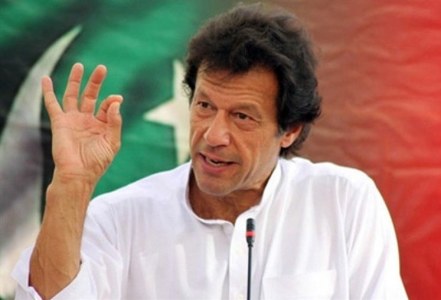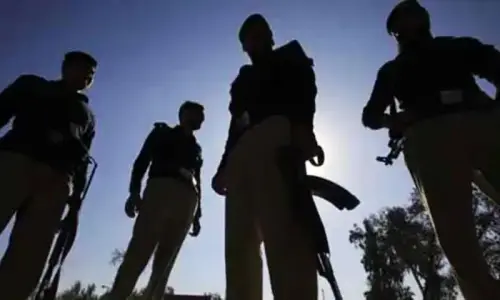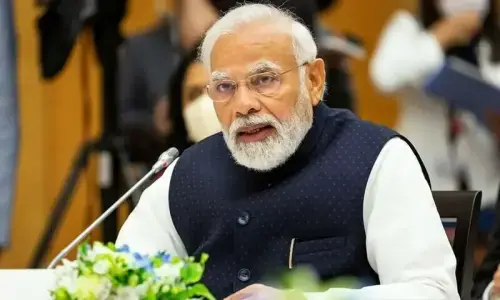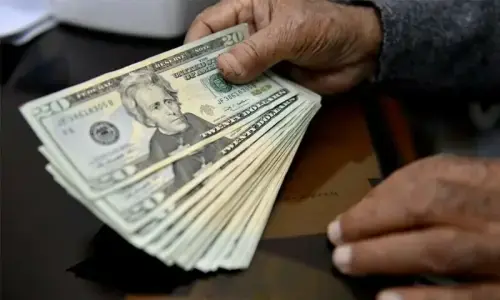
IN the death of Asghar Khan, Pakistan has lost a politician who wanted the country to have a clean political culture but could not get a chance to translate his perception into reality — for which he struggled for long after retirement from the Pakistan Air Force and Pakistan International Airlines.
Asghar Khan was the first politician who changed many parties to attain what he thought of politics. He was a great fighter in the air force, a good disciplinarian and an honest politician lost in the vagaries of Pakistan’s political culture.
Born in 1921 into an Afridi family settled in Kashmir, he joined the Indian Air Force and secured commission in 1940. His remarkable dedication towards his profession was such that he was given the command of a squadron in 1945; he was the first Indian to get that charge.
He had passion for his squadron to such an extent that the squadron became synonymous with his name and when assets of armed forces were being distributed between Pakistan and India after independence, he asked his superiors to give that squadron to Pakistan and he was obliged. In 1957, at the age of 36, he became the first Pakistani and the youngest chief of the Pakistan Air Force. He retained that position till a few weeks before the 1965 war with India. During his career with PAF, he was also responsible for its expansion and improving its capacity as a defender of the skies.
After retirement from the PAF, he was appointed as chief of Pakistan International Airlines, bringing discipline and growth to the airlines. He was considered as a good administrator for a growing organisation. But after staying in the PIA for some time, he quit it to join politics.
He opposed Gen Ayub Khan’s rule. In this quest he became a diehard supporter of Zulfikar Ali Bhutto who had launched a campaign against Ayub Khan. When the general jailed Bhutto, Asghar took up his campaign and became so close to Bhutto that many considered him as his possible successor.
When the opposition movement against Ayub Khan gained momentum in March 1969, Ayub Khan convened a Round Table Conference which was boycotted by Bhutto but attended by other parties. This conference failed to reach consensus as Ayub Khan stubbornly opposed the idea of undoing One Unit and giving away his so-called parity formula. Asghar Khan attended that conference but at its end he announced the formation of his own party — the Justice Party.
A few months later he merged his party with Nawabzada Nasrullah Khan’s Pakistan Democratic Front, but soon decided to keep away from politics and go for a retired life. This too did not last long and he soon formed his Tehreek-i-Istaqlal and from its platform contested the 1970 election which he lost. He was among those leaders who were swept away by Bhutto’s charisma which brought him majority in the then West Pakistan and after military action in the East Pakistan made him prime minister. Asghar Khan did not lose heart but to live in political arena he did not follow the practices prevalent in Pakistani politics.
He developed differences with Bhutto which continued for many years. He even opposed Bhutto’s decision to recognise Bangladesh. This again led to political bickering and he was jailed. In the election year (1977) during the Bhutto government, he joined hands with the nine-party alliance called the Pakistan National Alliance (PNA) which mobilised every force against Bhutto to declare the elections as farcical. Asghar Khan contested the polls and won on one seat. But the outcry of PNA attained heights.
During that movement Asghar Khan wrote a letter to chiefs of armed forces to obey only ‘lawful orders’ of the government. The letter became controversial and also paved way for army intervention, brought an end to Bhutto reign, plunging the country into another martial law led by Gen Ziaul Haq.
Asghar Khan did not want a prolonged rule by Ziaul Haq; instead he wanted polls to be held as provided in the constitution. Since Ziaul Haq did not show any indication for holding elections, he also joined Movement for the Restoration of Democracy (MRD) in 1983. He opposed the non-party polls of 1985 but contested 1988 elections after the death of Ziaul Haq, and once again lost.
Asghar Khan continued his political sojourn but without much success. However, he resumed writing his observations and experiences, which he had begun (his first book was The First Round) after the 1965 war with India. The book appeared in 1979. This kept him busy but again he contested the 1988 and 1993 polls which also proved to be a futile attempt to reach parliament. After this he decided to retire and spend a homely life and handed over party affairs to his son Omar Asghar Khan.
He did not react to the 1999 takeover by Gen Pervez Musharraf and allowed his son to join the government as a minister. He also renamed his party as the National Jamhoori Party, but before the party could contest the 2002 polls, his son died mysteriously, giving Asghar another shock and pushing him to take shelter in a retired life.
After his retirement from PAF in 1965, Asghar Khan also concentrated on writing, a skill very few politicians have shown in Pakistan. But unlike many he stuck to his personal information and the events that involved himself or he was an observer to them. Among them, the first one was The First Round, being about the 1965 war with India, brought many names in picture and created ripples in the national press.
The other one was Generals in Politics, appearing in 1983. He also came out with an Urdu book titled Islam, jamhooriyat aur Pakistan in 1999. Similarly the book We Have Learnt Nothing from History: Politics and Military Power appeared in 2005, which according to him, was written in 1985 but was not allowed to be published at that time. Another book was The Pakistan Experience: State and Religion in 1985.
In the book We Have Learnt Nothing from History, he described how ISI initiated covert operation in 1988 to contain Pakistan Peoples Party in the polls. He also took the petition on the subject to the Supreme Court in 1999, which continued pending decision for many years.
Asghar Khan’s life was full of adventure — from a pilot to a politician and a writer. His views were too idealistic and could not find conformity with general political practices in Pakistan, perhaps his thinking did not match the engineered politics. But it became apparent that he was a firm believer in democracy, honest political culture and natural justice.
Published in Dawn, January 6th, 2018































